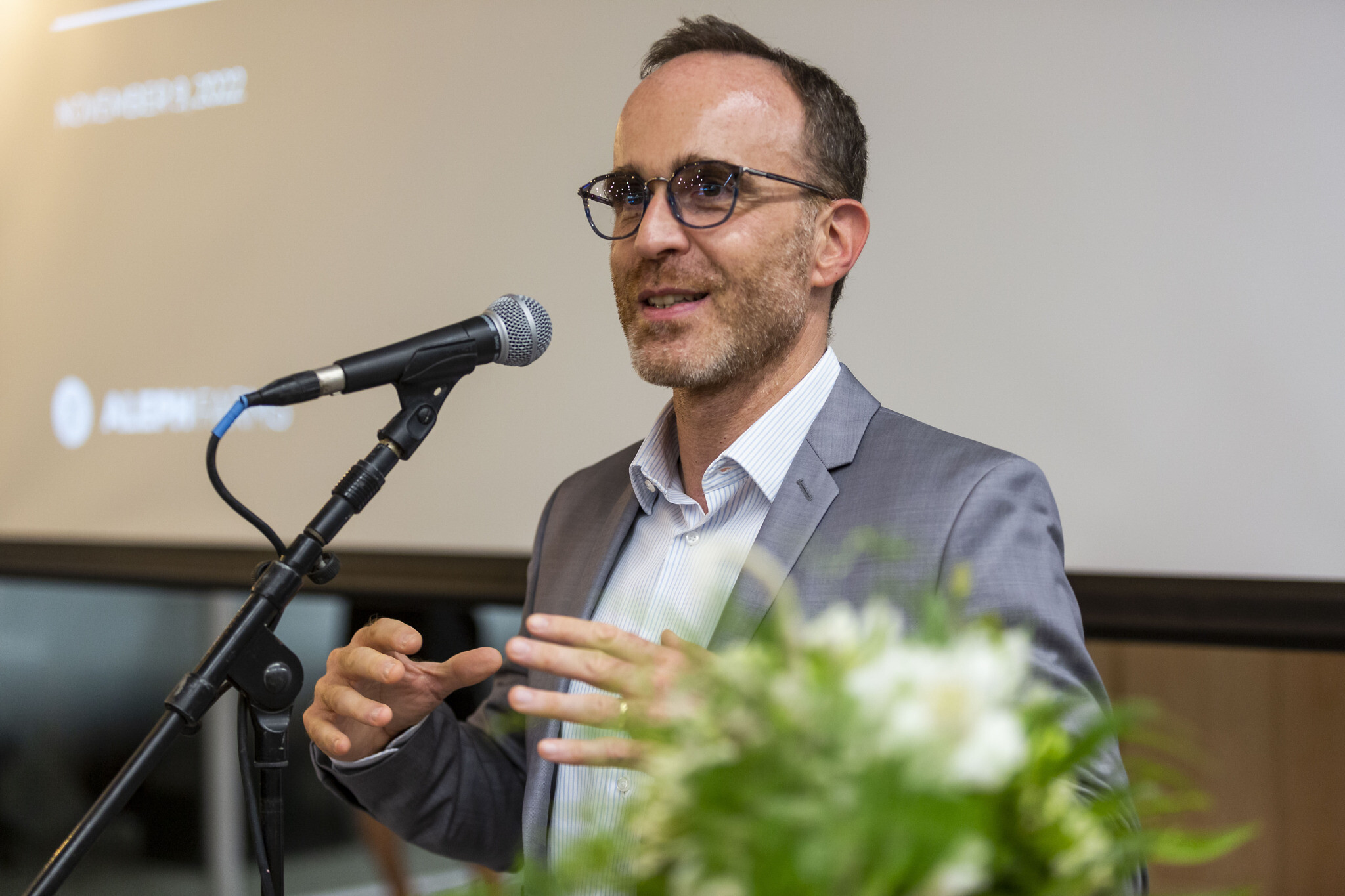Cultivated kosher meat could soon be on our plates
The founder of Aleph Farms sets his sights on bringing the delicacy to the UK
An Israeli start-up responsible for creating the world’s first kosher cultivated meat hopes to bring the product to the UK within a couple of years.
Aleph Farms, which counts Hollywood actor Leonardo DiCaprio among its investors, recently received a game-changing kosher nod from The Chief Rabbi of Israel, David Baruch Lau, for its cultivated thin-cut beef steak, a decision that opens the door for a full kosher certificate ahead of its market launch later this year in Israel, pending regulatory approval.
Aleph Farms has submitted its application for regulatory review in Israel and expects to receive a positive response soon. It is now in advanced discussions with premier chefs, restaurant owners and hospitality groups to help make this happen. And the company’s founder and CEO Didier Toubia tells the Jewish News that “(they) are working with UK regulatory authorities in order to move closer to market launch.”
Aleph Farms’ products are made from starter cells that come from a fertilised egg, which was sourced from a premium Black Angus cow named Lucy. From a one-time collection of Lucy’s fertilised egg, Aleph Farms can grow thousands of tons of cultivated meat without engineering or immortalising cells, avoiding harming the animal and acting as part of an inclusive solution for sustainable and secure food systems.

The company will still need to work with local rabbinic authorities on the issuance of an actual kosher certificate, and while it’s not the first time a rabbi recommended that Aleph Farm’s products be certified as kosher, it is the first time a Chief Rabbi, as leader of the Chief Rabbinate, has issued such a decision. Toubia, a trained food engineer and biologist, says it’s a key moment for Aleph Farms and the entire cultivated meat sector.
He says: “It sets a foundation for an inclusive public discourse about the intersection of tradition and innovation in our society. At Aleph, we innovate in order to provide quality nutrition to anyone, anytime, anywhere in service of people and the planet, and that includes people with different culinary traditions. We’re excited that more groups of diners can enjoy our products safely within the bounds of their religious tradition, helping us to advance our inclusive vision for food security and tap into different food cultures around the world.”
Toubia says the UK has demonstrated its support for cellular agriculture as one of the key solutions that can ensure food security and address food-related climate challenges. “The UK mentioned cultivated meat in its Plan for Growth as part of the benefits of Brexit and The UK Research and Innovation (UKRI) allocated £14 million more in funding to 11 research projects. This includes research being conducted by Royal Agricultural University (in collaboration with Aleph Farms) that examines the impact of cultivated meat on livestock farmers.”

Prince William and Sir David Attenborough have endorsed Aleph Farms’ technology, highlighting the company during an episode of the BBC’s Earthshot Prize.
How long before a majority of restaurants and caterers have cultivated meat options on their menus? “Availability of our product in 2023, pending regulatory approvals, will be on a limited scale in the form of intimate tasting events and exclusive restaurant offerings. This soft launch will better enable diners to provide us with direct feedback upon tasting the product, which will inform our marketing and product development strategies. It might take a few years before our products reach the mainstream market in the form of widespread sales.”
In the meantime, cultivated meat is a growing business, expected to reach $25 billion by 2030, according to McKinsey. The global kosher beef market is expected to reach approximately $100 billion by 2030.
Founded in 2017, Aleph Farms is the brainchild of Toubia, together with leading food company Strauss Group and top research university Technion – Israel Institute of Technology. It has raised more than $118 million to date, including an investment from environmental activist and Academy Award winner Leonardo DiCaprio, who sits on the company’s Sustainability Advisory Board.
The company has announced MoUs (memorandums of understanding) with Mitsubishi Corporation in Japan, BRF in Brazil, CJ CheilJedang in South Korea and Thai Union in Thailand.
“These MoUs will accelerate these countries’ transitions to becoming robust, self-sufficient and climate-neutral leaders in food production. Other large producers, including Cargill in the US and Migros in Switzerland, have also invested in Aleph Farms. They view cultivated meat as an opportunity for new production streams alongside core conventional production and as an enabler for meeting their countries’ and organisations’ respective climate and food security goals.”
Lau’s ruling signifies an openness among religious authorities to publicly assure adherents that cultivated meat products are appropriate to consume. Aleph Farms is also contacting Muslim, Hindu, and other religious authorities for their approvals.
Toubia says that it could take a few years from launch before the price of cultivated meat, once it hits the market, is on par with the general kosher beef market. Initially the steaks will be priced similarly to ultra-premium beef until strategic agreements across supply chains can be reached.
So you might have to hold the cheese on that burger for a little while longer.

Thank you for helping to make Jewish News the leading source of news and opinion for the UK Jewish community. Today we're asking for your invaluable help to continue putting our community first in everything we do.
For as little as £5 a month you can help sustain the vital work we do in celebrating and standing up for Jewish life in Britain.
Jewish News holds our community together and keeps us connected. Like a synagogue, it’s where people turn to feel part of something bigger. It also proudly shows the rest of Britain the vibrancy and rich culture of modern Jewish life.
You can make a quick and easy one-off or monthly contribution of £5, £10, £20 or any other sum you’re comfortable with.
100% of your donation will help us continue celebrating our community, in all its dynamic diversity...
Engaging
Being a community platform means so much more than producing a newspaper and website. One of our proudest roles is media partnering with our invaluable charities to amplify the outstanding work they do to help us all.
Celebrating
There’s no shortage of oys in the world but Jewish News takes every opportunity to celebrate the joys too, through projects like Night of Heroes, 40 Under 40 and other compelling countdowns that make the community kvell with pride.
Pioneering
In the first collaboration between media outlets from different faiths, Jewish News worked with British Muslim TV and Church Times to produce a list of young activists leading the way on interfaith understanding.
Campaigning
Royal Mail issued a stamp honouring Holocaust hero Sir Nicholas Winton after a Jewish News campaign attracted more than 100,000 backers. Jewish Newsalso produces special editions of the paper highlighting pressing issues including mental health and Holocaust remembrance.
Easy access
In an age when news is readily accessible, Jewish News provides high-quality content free online and offline, removing any financial barriers to connecting people.
Voice of our community to wider society
The Jewish News team regularly appears on TV, radio and on the pages of the national press to comment on stories about the Jewish community. Easy access to the paper on the streets of London also means Jewish News provides an invaluable window into the community for the country at large.
We hope you agree all this is worth preserving.






















